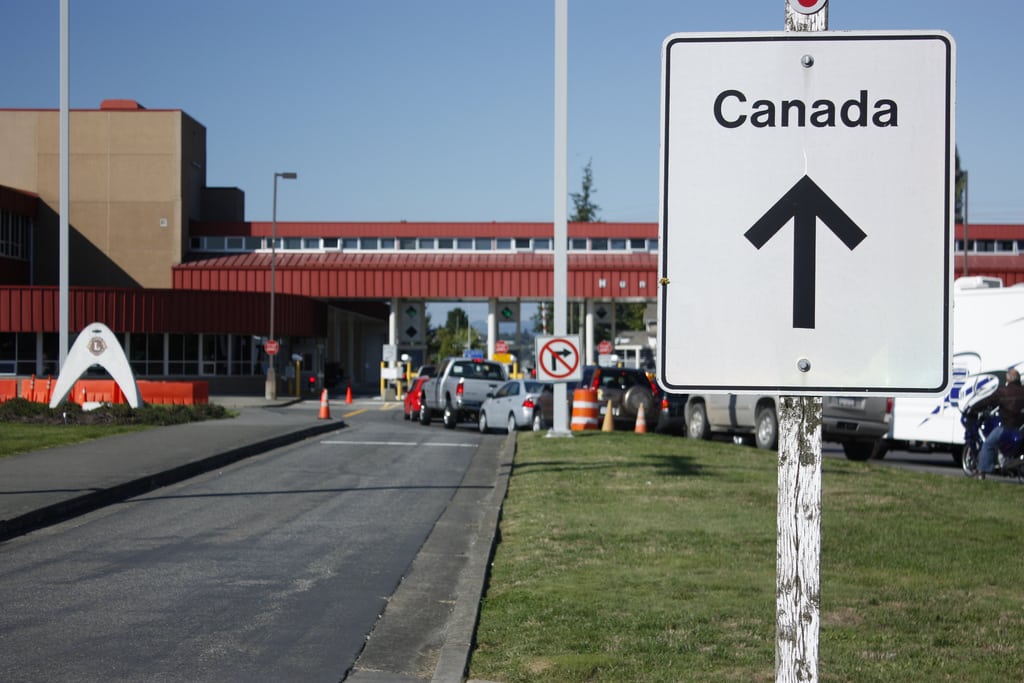Skift Take
U.S.- Canada daily traffic could be affected in a big way if this is the law. and now that it is out in public instead of being buried in a thick budget proposal, it wil get the proper debate it requires.
The idea of charging a fee to cross the U.S.-Canadian border is being floated, and so far it is not very popular.
“Once again, we have proof that you can never underestimate the capacity of some supposedly well-informed people in Washington to suggest stupid things,” Garry Douglas, president of the North Country Chamber of Commerce, said in a statement to the Press-Republican.
Douglas was talking about a proposal from the federal Department of Homeland Security to conduct a study to see if it would be a good idea to charge people for crossing the border.
The study would include assessing the feasibility of collecting a fee at both the northern and southwestern borders of the United States.
According to Homeland Security’s budget submission, the study should investigate:
–The feasibility of collecting from existing operators on the land border such as bridge commissions, toll operators, commercial passenger bus, and commercial passenger rail.
–Requirements to collect at land ports of entry where existing capability is not present.
–Any legal and regulatory impediments to establishing and collecting a land border crossing fee.
It doesn’t specify whether the fee would be charged for those entering or leaving the United States or how much it would cost.
‘BAD IDEA’
Congressman Bill Owens (D-Plattsburgh), who is the co-chairman of the Congressional Northern Border Caucus, said he strongly opposes any fees.
“Imposing a fee to cross the border is a bad idea, plain and simple,” he said in a news release.
“I represent a number of communities that depend on Canadian travelers and investment to support local business and job growth. Instead of adding an additional barrier for commerce, we should be taking more steps to ease the legitimate flow of people and goods between the two countries.”
Owens said he would “explore all legislative options available to me to prevent this move in the months ahead.”
TRADE PARTNERS
According to information from the chamber, the United States and Canada share a $1.2 trillion economic relationship, including trade, tourism and other activities.
Canada remains the largest source of foreign direct investment in the United States, the chamber information says.
Tourists from Canada made more than 21 million trips to the United States in 2011, spending more than $24 billion in the process.
Canada accounts for an economic impact of more than $1.6 billion in Clinton County each year, according to the chamber information.
DAMAGE
Plattsburgh State men’s soccer coach Chris Waterbury travels to Canada frequently to recruit players and attend Montreal Impact Major League Soccer games, for which he has season tickets.
“Canadians traveling to Clinton County help our economy tremendously, and adding a fee to cross the border would deter that and damage our economy,” he said.
“We should be doing the opposite and encouraging more people to cross the border.”
JOINT PLAN
Douglas said a fee could severely hinder the strong economic relationship the United States has with its northern neighbor.
“Let’s take America’s No. 1 economic asset — that being its relationship with Canada and the function of the U.S.-Canadian border — and turn it into a dysfunctional catastrophe,” he said sarcastically.
“Thankfully, I am confident that (with) the engagement of the congressional delegation of the northern border states — led by Congressman Owens in the House and (New York) Sens. (Charles) Schumer and (Kirsten) Gillibrand and (Vermont’s Patrick) Leahy rallying more than 20 members of the U.S. Senate — this will never happen.”
Douglas said that even discussing such an idea is bad news.
“Unfortunately, in the near term, (Homeland Security) Secretary (Janet) Napolitano and others are doing fresh harm to our relationship with our Canadian friends by once again bringing up this nonsensical notion and feeding uncertainty about future border fluidity just when we are working through the Beyond the Border process to convey the opposite.”
Beyond the Border is a joint plan, released in late 2012, for the United States and Canada to improve security at the border while expediting lawful travel and trade.
Email Joe LoTemplio: [email protected] ___
![]()
The Daily Newsletter
Our daily coverage of the global travel industry. Written by editors and analysts from across Skift’s brands.
Have a confidential tip for Skift? Get in touch
Tags: canada, dhs, regulations, usa
Photo credit: Canada is this way, but it may cost soon. Great Beyond / Flickr.com
